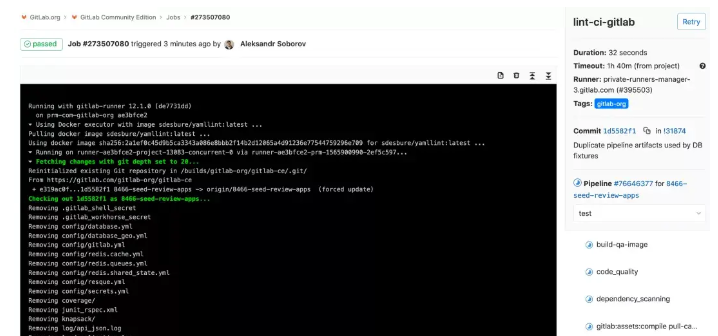系列文章目录
【Linux服务器Java环境搭建】
前言
又到了周五晚上了,最近工作上有些忙,忙于一个需求频繁变更的项目,都快吐血了,懂得都懂,哈哈,正好有时间了,继续写系列【Linux服务器Java环境搭建】吧,争取这两天把整个系列都写完,加油! 那就继续吧,今天主要是安装和配置Nginx。
一、Nginx是什么?
Nginx(发音类似于“engine-x”)是一款开源的、高性能的HTTP服务器和反向代理服务器,同时也是一个IMAP/POP3/SMTP邮件代理服务器。它最初由俄罗斯的程序员伊戈尔·赛索耶夫(Igor Sysoev)在2004年发布,旨在解决C10K问题,即如何高效处理超过一万个并发连接的问题。
Nginx广泛应用于各种互联网服务,包括Web服务器、内容分发网络(CDN)、负载均衡器和API网关等。它不仅在高流量网站和应用中得到了广泛应用,而且也是许多微服务架构和云原生应用的首选组件。
-
高性能和高并发:Nginx以其高效的事件驱动架构著称,可以处理大量的并发连接,远高于传统的Apache HTTP服务器。
-
低资源消耗:由于其高效的架构,Nginx在处理大量请求时消耗的内存和CPU资源非常少。
-
负载均衡:Nginx可以作为反向代理服务器,将客户端的请求分发到多个后端服务器,以实现负载均衡,提高应用的可用性和稳定性。
-
静态文件服务:Nginx在提供静态文件(如HTML、图像、视频等)方面表现出色,能够快速、高效地处理这些请求。
-
反向代理:Nginx可以作为反向代理服务器,将客户端请求转发到后端的应用服务器,并处理来自后端服务器的响应。
-
模块化设计:Nginx采用模块化设计,允许用户根据需求加载或卸载不同的模块,以实现扩展功能,例如SSL/TLS、身份验证、访问控制等。
-
简单的配置文件:Nginx的配置文件使用简单而直观的语法,便于配置和管理。
二、下载及安装
1.nginx下载
下载地址:nginx: download

import numpy as np
import pandas as pd
import matplotlib.pyplot as plt
import seaborn as sns
import warnings
warnings.filterwarnings('ignore')
import ssl
ssl._create_default_https_context = ssl._create_unverified_context
2.预先安装所需依赖
yum -y install pcre-devel
yum -y install openssl openssl-devel在安装Nginx之前,先安装以下软件包是因为Nginx的某些功能和模块需要这些包中的文件和库来支持和编译。
-
pcre-devel: PCRE(Perl Compatible Regular Expressions)软件包提供了正则表达式的支持。Nginx使用PCRE来支持HTTP模块中的正则表达式匹配功能。
-
openssl 和 openssl-devel: OpenSSL是一个用于加密和安全通信的库。Nginx可以使用OpenSSL来支持HTTPS和SSL/TLS协议,openssl-devel则提供了开发过程中所需的文件和头文件,以便Nginx可以与OpenSSL进行集成。
安装这些软件包是为了确保在编译Nginx时拥有必要的依赖项,从而支持Nginx的各种功能和模块,特别是与HTTPS、压缩和正则表达式相关的功能。
3.nginx安装
A.将安装包通过xftp上传到服务器目录/root/lzh/

B.在目录 /usr/local/ 下创建 nginx ⽂件夹并进⼊
[root@lzh-2024 local]# cd /usr/local/
[root@lzh-2024 local]# mkdir nginx
[root@lzh-2024 local]# cd nginx/
[root@lzh-2024 nginx]#
C.将刚下下载的Nginx 安装包解压到 /usr/local/nginx 中
[root@lzh-2024 nginx]# tar zxvf /lzh/nginx-1.26.1.tar.gz -C ./
解压完之后, /usr/local/nginx ⽬录中会出现⼀个 nginx-1.26.1的⽬录

4.设置并安装nginx
A.设置
[root@lzh-2024 nginx]# cd nginx-1.26.1/
[root@lzh-2024 nginx-1.26.1]# ./configure

B.安装
[root@lzh-2024 nginx-1.26.1]# make && make install

安装完成后,Nginx的可执⾏⽂件位置位于
/usr/local/nginx/sbin/nginx

三、启动或停止Nginx
A.启动命令
[root@lzh-2024 sbin]# /usr/local/nginx/sbin/nginx
B.停止命令(nginx后一定要加空格)
[root@lzh-2024 sbin]# /usr/local/nginx/sbin/nginx -s stop
C.重启命令(nginx后一定要加空格)
[root@lzh-2024 sbin]# /usr/local/nginx/sbin/nginx -s reload
D.配置文件位置
[root@lzh-2024 sbin]# cat /usr/local/nginx/conf/nginx.conf
如下为整个配置内容
#user nobody;
worker_processes 1;
#error_log logs/error.log;
#error_log logs/error.log notice;
#error_log logs/error.log info;
#pid logs/nginx.pid;
events {
worker_connections 1024;
}
http {
include mime.types;
default_type application/octet-stream;
#log_format main '$remote_addr - $remote_user [$time_local] "$request" '
# '$status $body_bytes_sent "$http_referer" '
# '"$http_user_agent" "$http_x_forwarded_for"';
#access_log logs/access.log main;
sendfile on;
#tcp_nopush on;
#keepalive_timeout 0;
keepalive_timeout 65;
#gzip on;
server {
listen 80;
server_name localhost;
#charset koi8-r;
#access_log logs/host.access.log main;
location / {
root html;
index index.html index.htm;
}
#error_page 404 /404.html;
# redirect server error pages to the static page /50x.html
#
error_page 500 502 503 504 /50x.html;
location = /50x.html {
root html;
}
# proxy the PHP scripts to Apache listening on 127.0.0.1:80
#
#location ~ \.php$ {
# proxy_pass http://127.0.0.1;
#}
# pass the PHP scripts to FastCGI server listening on 127.0.0.1:9000
#
#location ~ \.php$ {
# root html;
# fastcgi_pass 127.0.0.1:9000;
# fastcgi_index index.php;
# fastcgi_param SCRIPT_FILENAME /scripts$fastcgi_script_name;
# include fastcgi_params;
#}
# deny access to .htaccess files, if Apache's document root
# concurs with nginx's one
#
#location ~ /\.ht {
# deny all;
#}
}
# another virtual host using mix of IP-, name-, and port-based configuration
#
#server {
# listen 8000;
# listen somename:8080;
# server_name somename alias another.alias;
# location / {
# root html;
# index index.html index.htm;
# }
#}
# HTTPS server
#
#server {
# listen 443 ssl;
# server_name localhost;
# ssl_certificate cert.pem;
# ssl_certificate_key cert.key;
# ssl_session_cache shared:SSL:1m;
# ssl_session_timeout 5m;
# ssl_ciphers HIGH:!aNULL:!MD5;
# ssl_prefer_server_ciphers on;
# location / {
# root html;
# index index.html index.htm;
# }
#}
}
四、 验证
在浏览器中输入服务器IP地址(端口默认为80,可以省略),如果浏览器看到如下界面,安装成功

五、总结
至此,Nginx就安装完成了,其实还是挺简单的是吧,今天只是简单安装以及启动停止Nginx,在系列【Linux服务器Java环境搭建】的后续部分,将会结合实际项目对站点的发布以及部署进行讲解,到时候会详细讲解Nginx的具体配置,敬请期待!


















![[SUCTF 2019]EasySQL1](https://i-blog.csdnimg.cn/direct/64769093e87a4dc3b6390b5636339b93.png)